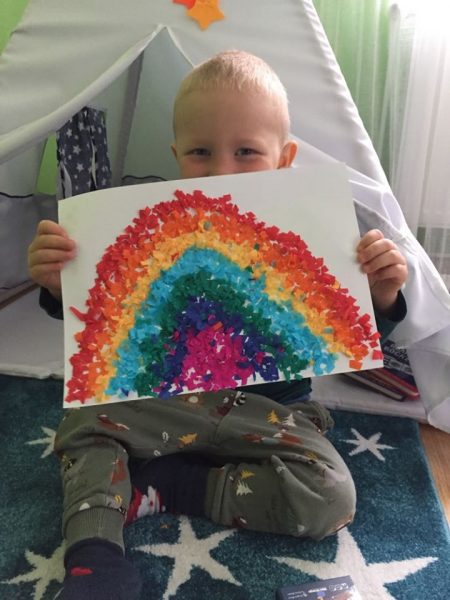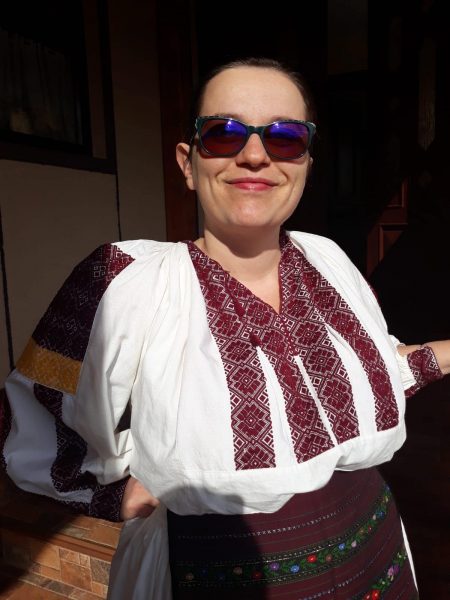Work, Politics, and Love under the Pandemic Specter
Romania, Spring 2020
by Andra Stan-Dragotesc, mom of two, on maternity leave from her job as manager of the international relations office at West University of Timisoara, Romania

The reality of the COVID-19 pandemic hit me on my son’s third birthday, March 10th. We had a small party at his kindergarten and took him for a piece of carrot cake (his favorite) at a small bakery near our apartment, in Timisoara, Romania. But we did all of this with some degree of precaution and, to be honest, fear. Just 6 days later, the state of emergency and a country-wide lockdown would be put in place in Romania. A few weeks earlier China had seemed far away. But, all of a sudden, Italy wasn’t far at all. We have close family living and working there, some in the healthcare sector, a result of European Union integration processes regarding movement of people and work access.
On March 11th the kindergarten where my son spends eight-nine happy hours a day closed; subsequently, me, him and my six months old daughter at the time moved into isolation, in the Romanian countryside, at my parents’ home. We haven’t been out since then. On March 16th my husband’s workplace, in the hospitality sector, closed without a time horizon for reopening. He joined us in the countryside. Everything happened SO fast. For us and everyone else. The feeling of urgency is a difficult one to handle. Things were happening on fast-forward and the situations we found ourselves in were unpredictable.
WORK. I am currently on maternity leave and grateful I do not have to give birth in these times in Romania. Fathers are not allowed on maternity wards, which is problematic on many levels. There are also major problems for pregnant women trying to access care, as well as women who opt for terminating pregnancies (no hospital in Bucharest, the capital of the country, performs abortions upon request). God, are we really going backwards on women’s basic rights now?! In Romania, a country where Ceausescu’s ban on abortions killed more or less 10,000 women not so long ago?!
As an international-relations-in-higher-education passionate and a visiting lecturer teaching her “Gender and Development” master-level course, I still do some work from home, out of loyalty to a team and a place where I found myself and grew, professionally. I don’t know how I would’ve juggled full-time work and parenthood with two small children, in isolation. I guess a lot of meetings could have been e-mails, but some just can’t. Also, moving entire education systems/levels online so quickly in a country where not all households own the technical instruments for participation in online classes/courses is complicated for every stakeholder involved. From where I stand now, the public-private divide regarding work politics and policies in Romania is deepening. The private sector was hit hard. It made direct and deep cuts, immediately. Ending contracts and leaving people unemployed in a matter of days, or placing them on “technical unemployment” (supported by the state, through governmental measures). This means people receive a state funded allowance of 75% of their gross salary, but no more than 75% of the country’s medium gross salary (this means you can’t receive an allowance higher than roughly 915 US dollars/month).
My husband is not working, and our income is diminished in comparison to last year’s spring period. He is technically unemployed. Some days it seems he is privileged. Some days, not so much. Depends whom you’re comparing yourself with: the IT people who continue to work from home and earn bonuses due to the fact that everyone needs them these days, or the unregistered workers that don’t even qualify for the above-mentioned allowance. The public sector hasn’t been hit very hard yet in terms of salaries, but pressure on governmentally funded institutions at all levels to resolve the crisis is enormous.
Also, history teaches us that, in Romania, this sector almost always pays a high price during and/or after crises. I don’t think this will be any different on the medium and long term. It already feels like no-cuts (personnel, salary, etc.) are seen as privilege. And privilege is problematic, especially here, economically, politically, and historically. And the economy will probably hit new lows soon. All I can say is I refrained from judgement as response to the Romanian migrant workers who took charter flights back to [insert EU “Western” country] in order to engage in agricultural work (that their citizens were unwilling to take up?). I’m sure there’s a moral and ethical matter there, I know there is, as well as a very complex economic and social counterargument. Both of them will probably refer to survival. Also, could we please spare the hypocrisy and realize that essential workers don’t need to be hailed as heroes, they need to be paid what they deserve?
POLITICS. During the first two weeks of lockdown I donated to hospitals, I made online lists of local businesses I wanted to promote and support, I commented on political and economic decisions, wrote e-mails to government officials in order to put pressure on them, burnt myself down with frustration. I was frustrated about the fact that people were starting to die in Romania too; that our public health system is in continuous cardiac arrest since forever and, once again we were not prepared, once again we didn’t have the necessary equipment, corruption was unmasked too late; that politicians began to instrumentalize the crisis for electoral gain; that I disagreed with some governmental decisions; that infected people have not been honest about their whereabouts and that led to tens of persons being identified as infected by one sole individual; that some people are treating the lockdown as a conspiracy and constantly find ways around it, disrespecting and putting other people in danger; that party-affiliations literally infect every dimension of life, still, even if in different ways than decades ago; that racism has bloomed almost infectiously this spring, especially against the Roma community; that the lockdown led to speculation on the market; that the militarization of our lives transformed exception into norms and Giorgio Agamben’s writings on the “state of exception” topic should be compulsory reading for everyone.
Do you know what’s interesting? The fact that in this general state of exception imposed in Romania, a country ruled by military orders now, our government sometimes creates some sort of super-exceptions from the rules it previously set through these orders. Mind-blowing and highly problematic from an ordinary citizen’s point of view. Just recently, the priests and volunteers of the Orthodox Church were allowed to go door to door, to share the light from Jerusalem, in lieu of people going to church on Easter night. Nevertheless, Romania took tough measures quickly in comparison to other countries. At this point it seems it was the right path to follow.
HEALTH. I have chronic asthma. I am also breastfeeding my daughter exclusively since birth and she’s only started eating solids last month. What if I get infected? I remember crying one evening while reading a doctor’s story from the Romanian region of Suceava, one of the epicenters of the virus spread in our country. Before being transferred to the hospital in Suceava, that needed his expertise, the doctor had been confident that he was well prepared. However, he quickly realized how unprepared he actually was once he entered that hospital and started treating COVID-19 patients. The best infectious disease specialist in Western Romania writes posts in a Facebook group with tens of thousands of members and tries to teach people about the new coronavirus, how to stay safe, etc. He makes time for that although the team he manages has the highest rate of healed COVID-19 cases in the country. Humility is a great thing. It could help move mountains. There’s just so little of it.
Romania still tests few people, in my opinion. But, as a person that followed international news on the topic before we even had our first cases, really, the situation is dramatic everywhere, nobody was really prepared for the intensity of this pandemic blow. In comparison to others, the Romanian health system was and still is lacking, not only advanced equipment for treatment, but also basic protection equipment for prevention and procedures to address a pandemic. We have a public health system full of problems that were suppurating here and there. Now they’re bleeding all over. Hopefully, after all of this will have passed somehow, we will address and resolve them, not simulate change and action, as we did for the last 30 years, but actually implement change. Romania is a country that always did well importing policy and implementing it inefficiently. Some of the price for that is being paid now and has been paid in every crisis that involved our hospitals.

LOVE. Two months ago everything moved online, from shopping to teaching, from work to family and friends gatherings. There were positive and negative consequences to all of these transfers of experience into the virtual world. Now, we are very close to the shift from a state of emergency to a state of alert. Some people think this means we’ve gone through the pandemic and everything can go back to normal. Some are redefining their normality and continue to be cautious. The world is changing. Maybe we’ll hug less. Which, for me, as a person who loves her space, will be great. Maybe everyone will continue to disinfect and wash everything and I won’t seem weird for doing so since before the pandemic. Some days I want to do more, with myself, for my family, career-wise, as a parent and as a partner. I feel I should see and use this as a window of opportunity. But, there are also limits to what you can do in isolation, for you and for others. Probably that’s why some other days I just want to disconnect from the world as much as possible, exist in the present moment, bake no-sugar cookies and just love my kids under this spring sun. Maybe that’s how I’ll do it, one day at a time. For some reason, one thing I am certain this pandemic hasn’t taken from me is hope.